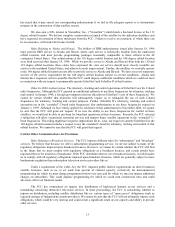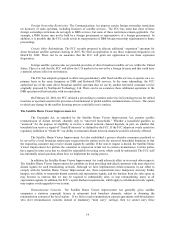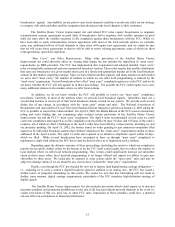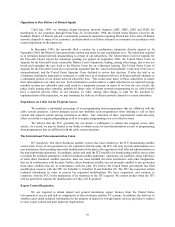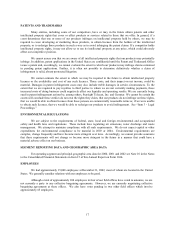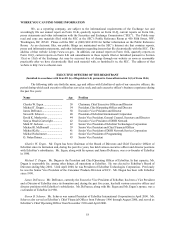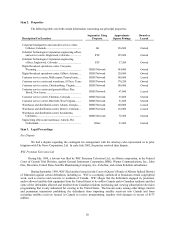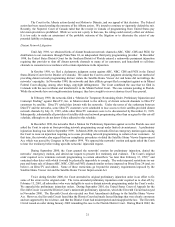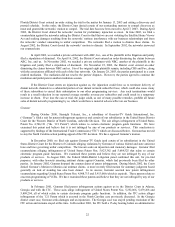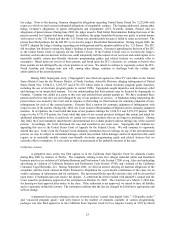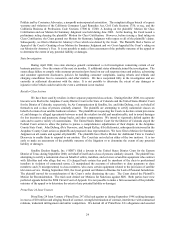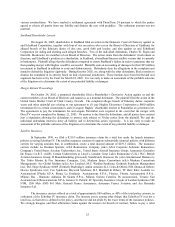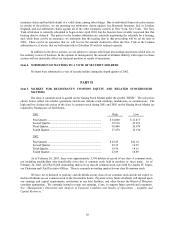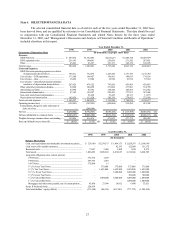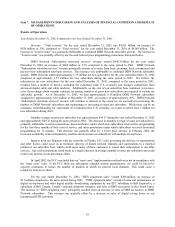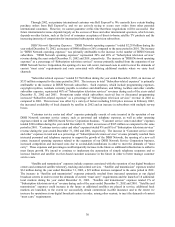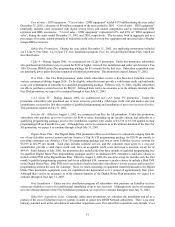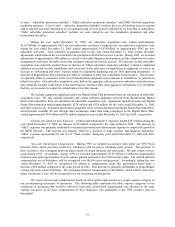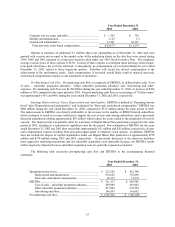Dish Network 2002 Annual Report Download - page 25
Download and view the complete annual report
Please find page 25 of the 2002 Dish Network annual report below. You can navigate through the pages in the report by either clicking on the pages listed below, or by using the keyword search tool below to find specific information within the annual report.23
law judge. Prior to the hearing, Gemstar dropped its allegations regarding United States Patent No. 5,252,066 with
respect to which we had asserted substantial allegations of inequitable conduct. The hearing addressed, among other
things, Gemstar’s allegations of patent infringement and respondents’ (SCI, Scientific Atlanta, Pioneer and us)
allegations of patent misuse. During June 2002, the judge issued a Final Initial Determination finding that none of the
patents asserted by Gemstar had been infringed. In addition, the judge found that Gemstar was guilty of patent misuse
with respect to the `121 Patent and that the `121 Patent was unenforceable because it failed to name an inventor. The
parties then filed petitions for the full ITC to review the judge’s Final Initial Determination. During August 2002, the
full ITC adopted the Judge’s findings regarding non-infringement and the unenforceability of the `121 Patent. The ITC
did not adopt, but did not overturn, the Judge’s findings of patent misuse. Gemstar is appealing the decision of the ITC
to the United States Court of Appeals for the Federal Circuit. If the Federal Circuit were to overturn the Judge’s
decision, such an adverse decision in this case could temporarily halt the import of our receivers and could require us to
materially modify certain user-friendly electronic programming guides and related features we currently offer to
consumers. Based upon our review of these patents, and based upon the ITC’s decision, we continue to believe that
these patents are not infringed by any of our products or services. We intend to continue to vigorously contest the ITC,
North Carolina and Georgia suits and will, among other things, continue to challenge both the validity and
enforceability of the asserted patents.
During 2000, Superguide Corp. (“Superguide”) also filed suit against us, DirecTV and others in the United
States District Court for the Western District of North Carolina, Asheville Division, alleging infringement of United
States Patent Nos. 5,038,211, 5,293,357 and 4,751,578 which relate to certain electronic program guide functions,
including the use of electronic program guides to control VCRs. Superguide sought injunctive and declaratory relief
and damages in an unspecified amount. It is our understanding that these patents may be licensed by Superguide to
Gemstar. Gemstar was added as a party to this case and asserted these patents against us. We have examined these
patents and believe that they are not infringed by any of our products or services. A Markman ruling interpreting the
patent claims was issued by the Court and in response to that ruling we filed motions for summary judgment of non-
infringement for each of the asserted patents. Gemstar filed a motion for summary judgment of infringement with
respect to one of the patents. During July 2002, the Court issued a Memorandum of Opinion on the summary judgment
motions. In its Opinion, the Court ruled that none of our products infringe the 5,038,211 and 5,293,357 patents. With
respect to the 4,751,578 patent, the Court ruled that none of our current products infringed that patent and asked for
additional information before it could rule on certain low-volume products that are no longer in production. During
July 2002, the Court summarily ruled that the aforementioned low-volume products did not infringe any of the asserted
patents. Accordingly, the Court dismissed the case and awarded us our court costs. Superguide and Gemstar are
appealing this case to the United States Court of Appeals for the Federal Circuit. We will continue to vigorously
defend this case. In the event the Federal Circuit ultimately determines that we infringe on any of the aforementioned
patents, we may be subject to substantial damages, which may include treble damages and/or an injunction that could
require us to materially modify certain user-friendly electronic programming guide and related features that we
currently offer to consumers. It is too early to make an assessment of the probable outcome of the suits.
California Actions
A purported class action was filed against us in the California State Superior Court for Alameda County
during May 2001 by Andrew A. Werby. The complaint, relating to late fees, alleges unlawful, unfair and fraudulent
business practices in violation of California Business and Professions Code Section 17200 et seq., false and misleading
advertising in violation of California Business and Professions Code Section 17500, and violation of the California
Consumer Legal Remedies Act. During September 2001, we filed an answer denying all material allegations of the
complaint, and the Court entered an Order Pursuant to Stipulation for a provisional certification of the class, for an
orderly exchange of information and for mediation. The provisional Order specifies that the class will be de-certified
upon notice if mediation does not resolve the dispute. A settlement has been reached with plaintiff’s counsel and the
Court issued its preliminary approval of the settlement on October 18, 2002. The Court has set a March 7, 2003 date
for hearing on final approval after notice to the class. If the settlement is not approved, we intend to deny all liability
and to vigorously defend the lawsuit. The settlement confirms that the late fee charged by EchoStar is appropriate and
will not change.
A purported class action relating to the use of terms such as “crystal clear digital video,” “CD-quality audio,”
and “on-screen program guide,” and with respect to the number of channels available in various programming
packages was also filed against us in the California State Superior Court for Los Angeles County in 1999 by David


